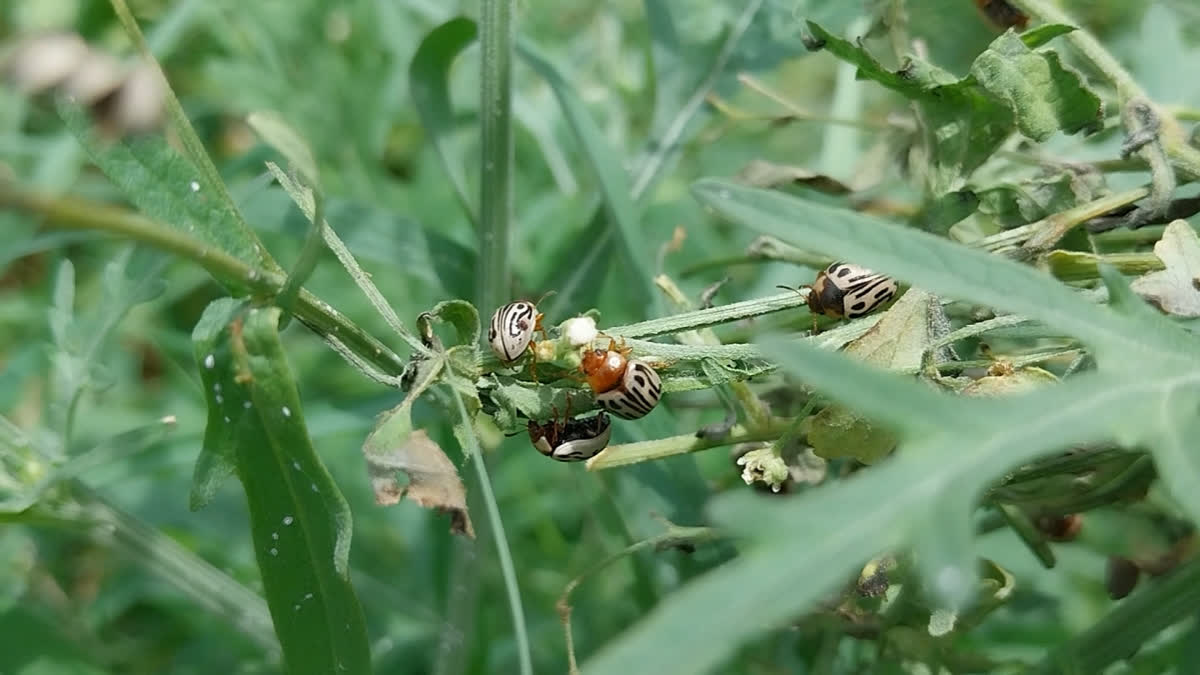Jabalpur (Madhya Pradesh): In a remarkable stride towards combating the widespread carrot grass infestation, scientists from the Directorate of Weed Research in Jabalpur have achieved a significant breakthrough. Successful trials have revealed that a tiny yet mighty worm, the Mexican beetle (Zygogramma bicolorata), holds the potential to be a natural remedy, rescuing India's agricultural economy from the clutches of the menacing Parthenium histophorus.
The threat posed by carrot grass, scientifically known as Parthenium histophorus, looms large over human society and agriculture. With a single carrot grass plant capable of spawning up to an astonishing 20,000 new plants, farmers face extensive crop damage that undermines their livelihoods. Furthermore, this invasive weed releases harmful chemicals that stifle the growth of other crops, posing a significant challenge to sustainable agricultural practices. Not to mention, direct contact with carrot grass triggers severe skin diseases and allergies in humans, while animals that consume it suffer from health issues, leading to toxic and bitter milk.
GS Mishra, Director of the Directorate of Weed Research said, "Mexican beetles have given us very promising outcomes and we are hopeful that we will succeed in eliminating the negative effect of carrot grass on agriculture of the country."
The origins of this invasive plant trace back to 1956 when the Indian Government imported red wheat from America. Unbeknownst to them, the grains contained carrot grass seeds, which eventually took root and spread across the country, becoming one of the most formidable threats to India's agricultural practices.
Also read: What will happen to agriculture this year? SBI Monsoon Impact Index offers some clue
The far-reaching consequences of carrot grass infestation extend beyond agriculture, adversely affecting biodiversity. The aggressive nature of this weed allows it to out-compete native tree plants, further exacerbating ecological imbalances.
In response to this dire situation, the Directorate of Weed Research has been diligently exploring various control methods. Chemical solutions like Metribuzin and 24 D glycoside have displayed some efficacy in eradicating carrot grass, but their prohibitive costs and labor-intensive procedures make widespread implementation impractical.
However, the recent discovery of the Mexican beetle's predation on carrot grass has instilled newfound hope in the fight against this invasive menace. Unlike chemical treatments, the Mexican beetle exclusively targets carrot grass while leaving other plants, humans, and animals unharmed. Its year-round activity makes it a potent weapon against the invasive weed.
Trials conducted in Jabalpur and Sidhi districts have yielded promising results, igniting optimism among farmers and researchers alike. To capitalize on this potential game-changer, scientists are actively training farmers in rearing techniques for these beneficial beetles. With the upcoming Carrot Awareness Week commencing on August 16, experts aim to disseminate crucial information about this natural solution to farmers, voluntary organizations, and even school children, fostering a collaborative approach to combat the carrot grass infestation
Also read: Explained: How Indian agriculture’s dependence on monsoon rains has come down
Despite the promising results, the complete eradication of carrot grass demands collective efforts from all sections of society. Only through widespread adoption of this natural control method can we envision a future free from the shackles of carrot grass infestation.



